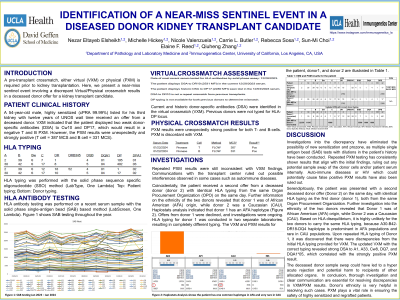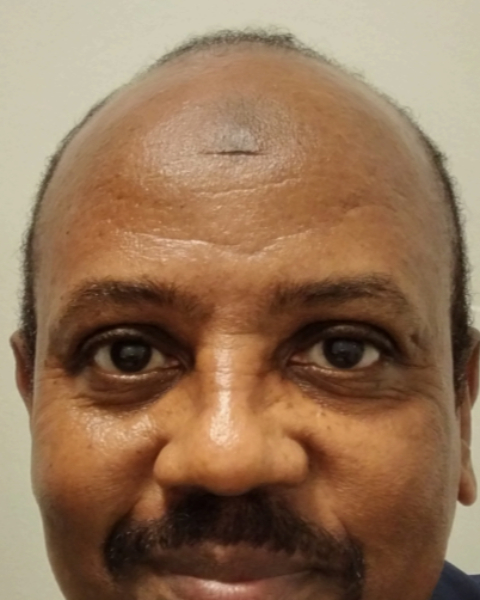Identification of a near-miss Sentinel Event in a Deceased Donor Kidney Transplant Candidate
(P606) Identification of a near-miss sentinel event in a deceased donor kidney transplant candidate
Location: Platinum Ballroom

Poster Presenter(s)
Body: A pretransplant crossmatch, either virtual (VXM) or physical (PXM) is required prior to kidney transplantation and are generally concordant. Here, we present a near-miss sentinel event with discrepant VXM/PXM results in a deceased donor offer for a kidney transplant candidate.
A 54-year-old, highly sensitized (cPRA 99.99%) male listed for his third kidney transplant. VXM indicated that the patient displayed two weak donor-specific antibodies (DSA) to Cw10 and DP17 against Donor 1, which would correlate with a negative T/ B PXM. However, the PXM results were unexpectedly and strongly positive (Table 1).
Investigation into the discrepancy ruled out new sensitization and prozone due to multiple single antigen bead (SAB) testing with dilutions in the patient’s history. Repeated PXM showed consistent results with the initial findings and ruled out a sample swap of the donor cells and/or patient serum internally. Auto-immune diseases or HIV that might cause false positive PXM were ruled out. Serendipitously, the patient received a second deceased donor offer (Donor 2) with identical HLA typing from the same Organ Procurement Organization on the that day. Additional information of the ethnicity of the two donors revealed that Donor 1 was African American (AFA) origin, and Donor 2 was a Caucasian (CAU). Based on HLA disequilibrium, it is nearly impossible for the two donors to carry the same HLA typing, because A30-B42-DR18-DQ4 ranks number one in AFA, and almost not existing in CAU populations. Repeated HLA typing of Donor 1 showed discrepant results from the initial HLA typing provided for VXM. The updated VXM with the correct typing showed strong DSA to A1, A33, Cw8, DQ7, and DQA1*05, which correlated with the strongly positive PXM result. The deceased donor sample swap could have resulted in a hyper acute rejection, as well as potential harm to recipients of other allocated organs.
Conclusion: In conclusion, thorough investigation and clear communication are essential for resolving discrepancies in VXM/PXM results. PXM plays a crucial role in ensuring the safety of highly sensitized and regrafted patients.
A 54-year-old, highly sensitized (cPRA 99.99%) male listed for his third kidney transplant. VXM indicated that the patient displayed two weak donor-specific antibodies (DSA) to Cw10 and DP17 against Donor 1, which would correlate with a negative T/ B PXM. However, the PXM results were unexpectedly and strongly positive (Table 1).
Investigation into the discrepancy ruled out new sensitization and prozone due to multiple single antigen bead (SAB) testing with dilutions in the patient’s history. Repeated PXM showed consistent results with the initial findings and ruled out a sample swap of the donor cells and/or patient serum internally. Auto-immune diseases or HIV that might cause false positive PXM were ruled out. Serendipitously, the patient received a second deceased donor offer (Donor 2) with identical HLA typing from the same Organ Procurement Organization on the that day. Additional information of the ethnicity of the two donors revealed that Donor 1 was African American (AFA) origin, and Donor 2 was a Caucasian (CAU). Based on HLA disequilibrium, it is nearly impossible for the two donors to carry the same HLA typing, because A30-B42-DR18-DQ4 ranks number one in AFA, and almost not existing in CAU populations. Repeated HLA typing of Donor 1 showed discrepant results from the initial HLA typing provided for VXM. The updated VXM with the correct typing showed strong DSA to A1, A33, Cw8, DQ7, and DQA1*05, which correlated with the strongly positive PXM result. The deceased donor sample swap could have resulted in a hyper acute rejection, as well as potential harm to recipients of other allocated organs.
Conclusion: In conclusion, thorough investigation and clear communication are essential for resolving discrepancies in VXM/PXM results. PXM plays a crucial role in ensuring the safety of highly sensitized and regrafted patients.

